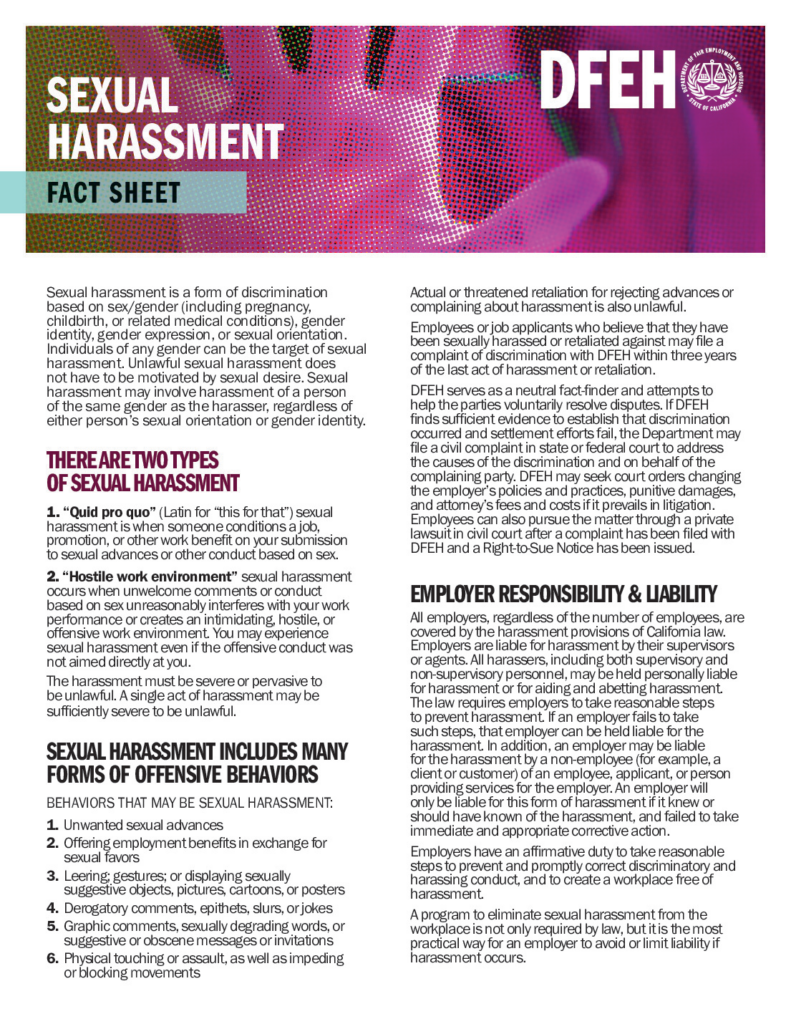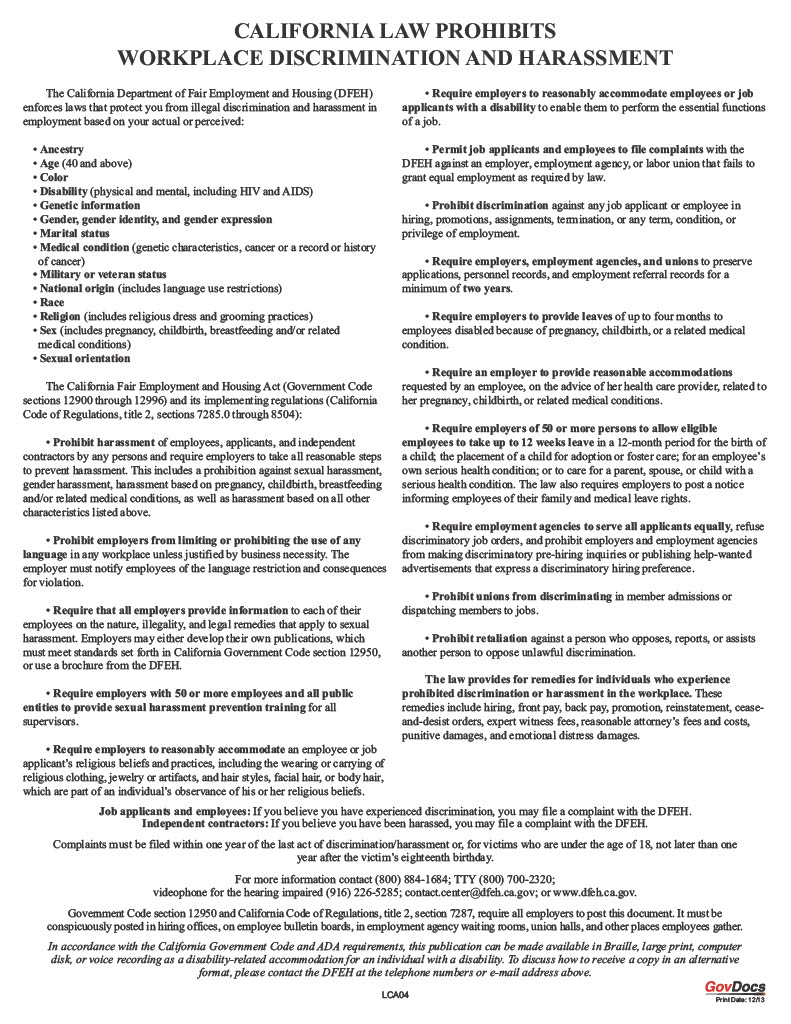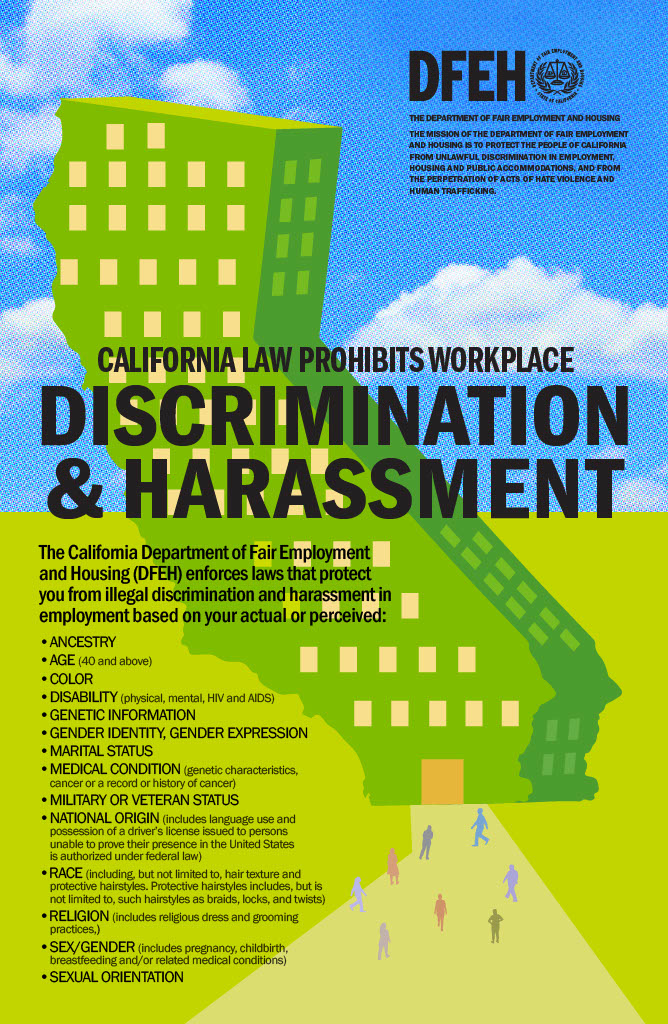
Retaliation occurs when an employer or superior punishes an employee for engaging in a legally protected act. These protected acts can range from reporting a safety code violation, reporting fraudulent activity, taking leave to care for a family member, or even reporting harassment or discrimination. Retaliatory behavior can take many forms including firing, salary reduction, reduced hours, job reassignment, demotion or any other negative action.
Workplace retaliation occurs when an employer takes an adverse employment action against an employee for engaging in legally protected behavior. There are many different bases for retaliation.
California law prohibits punishing job applicants or employees for asserting their rights to be free from employment discrimination including harassment. Asserting these rights is protected by California law, and if your employer retaliates against your assertion, you will have a retaliation in the workplace claim.
Reporting unlawful conduct that can give rise to a retaliation claim include:
Workers are also protected from retaliation for exercising certain legally guaranteed worker rights. Employers are not permitted to retaliate against California employees for:
Workplace retaliation can take many different forms. Any of the following conduct could constitute unlawful retaliation:

To prove a retaliation claim in California, an employee must show that (1) he has engaged in a "protected activity" - i.e. complaining about unlawful discrimination, unlawful harassment, safety violations, patient safety at a healthcare facility, or exercising a number of other protected rights under the law, (2) he suffered a tangible adverse employment action, such as demotion or termination, and (3) the reason or the main reason for being demoted or terminated is that protected activity. In other words, he was terminated "because" of the protected activity, and not for some other personal, non retaliatory reasons, however unfair or hurtful it might be.

Under California employment law, employers may not engage in workplace retaliation against employees who:
While employees are protected against wrongful termination in a variety of circumstances, employees who do not lose their jobs–but instead experience adverse employment actions, abuse, or other forms of unlawful retaliation at work–have a harder time finding legal remedies. These workplace retaliation provisions of California’s whistleblower laws and Fair Employment and Housing Act (“FEHA”) retaliation laws provide a legal remedy for employees whose employers retaliate against them -but do not fire them -for exercising his or her rights under these laws. These rights are protected by state or federal statute depending on the location of your work place and relevant government code.
In California, workplace retaliation refers to the career damaging actions an employer may take in punishing an employee who complains about, reports or aides in the investigation of the neglect of employee rights or illegal activity.
Whether or not you suffered the ultimate retaliation of termination, it’s important to understand that if you’ve engaged in conduct and you’ve been retaliated against, you still might have a claim. This is especially true for employees that are subject to unlawful harassment or discrimination based on disability, race, gender or sexual orientation. Some forms of retaliation occur where the employee never lost a day of work, never was demoted, never was passed over, but instead was subjected to a hostile work environment that included conduct against a protected class – racist name calling, repeated requests for sex, repeated exposure to sexually explicit issues, sexual harassment, etc. Those types of claims will involve what’s called a hostile work environment.

California employment law provides protection to employees against retaliated actions. Employers can retaliate against disciplinary actions for employees claiming unlawful behavior. Retaliation claims can be made on numerous grounds and retribution can vary in form. Continue reading to find out what is considered the type of retaliation that may arise.
Under California law, employers cannot retaliate against employees for protected activities such as reporting illegal conduct, reporting the underpayment of wages, filing a wage claim for lost wages, filing discrimination suits, reporting fraud, filing safety complaints, or refusing to help with unlawful activities. Sometimes retaliation is obvious, such as an employer firing a worker or openly yelling at him or her for filing a claim.
Other times, retaliation comes in the form of getting moved to a different office or shut out of group meetings. Unfair punishment, demerits, negative performance reviews, denial of promotions and raises, exclusion from programs, increased workload, violations of employment contracts, forced time off, and wrongful job termination are all examples of retaliation intended to punish employees.
Whatever form it comes in, retaliation is harmful and against the law. If you suspect that you have been a victim of workplace retaliation, contacting experienced employment attorneys can help protect your rights.
To prove that your employer retaliated against you after you filed a report of harassment, you must gather evidence of your employer’s conduct and calculate the damages you suffered due to this conduct.
When you sue an employer for retaliation, the objective of your case is to receive damages for the losses you incurred due to the retaliation. As you might expert, recovering compensation or damages through your claim requires showing that you suffered specific damages due to your employer’s actions.
At the beginning of the legal process, you will need to let your employment attorney know about the losses you’ve faced, and the more specific you can be at this stage, the better it is for your claim. There are many ways that you can prove damages during a retaliation claim, depending on the exact losses you’ve experienced. If you received a lower salary or reduced hours, you may provide W-2 forms, pay stubs, or any other documents that demonstrate your earnings both prior to the instance of retaliation and after to show the changes.
It is also possible that you’ve faced medical expenses, which could have been previously covered by the health care benefits your employer terminated. Again, you’ll need to provide documentation that demonstrates these losses in court – your word alone will not be sufficient to recover damages. Policies for employee benefits or employee benefit plans are other potential forms of evidence during a retaliation claim.
After you get in touch with a trusted employment attorney, they will begin to examine, compile, and organize all available evidence. The more evidence you have at your disposal, the easier it will be for you to prove that you were retaliated against.
Although the specific evidence can vary from case to case, your attorney can help you prove that:
Generally, there are three common kinds evidence that an employee can use in order to prove his retaliation claim:
(a) Timing. If demotion or termination occurred shortly after the employee engaged in a protected activity, this is one kind of fact that will help that employee prove that the reason for his termination was that protected activity. There is no bright line rule of what constitutes close timing for purposes of proving retaliation, and it depends on a lot of other circumstances, including the employee's length of service with the company, the nature of the protected activity, etc.
A typical situation where retaliation can likely be established through timing is where an employee, after working for a company for 10 years and receiving good reviews, starts receiving bad reviews, is placed on a PIP and terminated just a few months after suffering an injury, asking for an reasonable accommodation, or filing a workers comp claim.
(b) Retaliatory Statements. This kind of evidence is rarely available, but it is the strongest, most direct evidence of retaliation. Any statement by the employer who is later involved in demotion or termination, which suggests that he or she is unhappy about the employee engaging in a protected activity can be used to prove a retaliation claim. Some common examples are e-mails to the aggrieved employee, stating "I can't believe you backstabbed us with your complaints", "We are going to make your life harder, as we don't respect rats", "traitor", etc. It's really worth going through all documents and all available e-mails to try to find that kind of "smoking gun" as even one e-mail or one memo can make a difference between having a weak case and having a strong retaliation case.
(c) Other Employees Are Treated More Leniently. A less significant, but still helpful evidence in proving retaliation is showing that other employees are disciplined less harshly or not disciplined at all for similar violations or issues for which you have been told you were terminated.
Furthermore, you need to demonstrate that the report was made in good faith, meaning you file complaints out of concern for your well-being and the well-being of others, not out of spite or to damage the reputation of the company. Make sure that you provide your attorney with evidence that the claim was made in good faith, however possible. This is essential to moving forward with your retaliation claim.
Once you’ve successfully demonstrated that the report was made in good faith, you will need to prove that you filed a report of harassment that led to this illegal conduct. Remember to give your lawyer the name and title of the individual to who you initially reported the harassment, as well as any letters, emails, or other documents proving that you made the report. If any individuals witnessed you filing the report, then be sure to provide their names, as well.
If you have encountered retaliation for filing a harassment claim, then it’s crucial that you pursue legal civil action against your employer. Although instances of retaliation aren’t always simple to prove, it is far from an impossible feat. The best way to ensure you have a reasonable cause for a valid retaliation claim against your employer is to secure legal representation from knowledgeable attorneys who specialize in unlawful retaliation cases.
If you are an employee with retaliation or employee rights concerns in Orange County, Riverside, San Bernardino, Los Angeles, or San Diego counties, or a California employer dealing with allegations concerning wrongful termination, harassment, or other employment law issues, contact our law firm to speak with a California employment law attorney from Freeburg & Granieri, APC in Pasadena.
Our clients become friends, confidants, and repeat customers. Former clients are our best referral source.
Do not be a commodity, find an attorney who treats your legal issue with the care it deserves.
